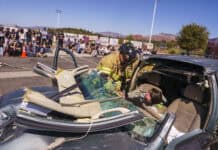
On May 8, 1945, 75 years ago today, representatives of Nazi Germany signed the German Instrument of Surrender in the Karlshorst borough of Berlin, surrendering unconditionally to the Allied Expeditionary Force — an alliance of the United States, the United Kingdom and its Commonwealth countries, Free France and numerous governments-in-exile of occupied European states — and the Supreme High Command of the Soviet Red Army.
The signing put an end to World War II in Europe, which had raged for nearly six years ever since the Nazi invasion of Poland in September 1939.
In the Pacific Theater, British and American fleets, and American, British and Chinese land forces, later joined by the Soviet Red Army 90 days after the surrender of Germany, fought Imperial Japan into surrender on Sept. 2, 1945, six years and one day after the war began.
An estimated 75 million to 80 million people died during the war, of which 62% were civilians, making the war one of the deadliest events in all of human history. Many of those civilians were not killed in combat zones but systematically murdered by their own state or by the nations that invaded and occupied their country.
Most of the men and women who served and are still alive today are now in their 90s or older. For most of us, we had a parent, grandparent or great-grandparent who served.
My maternal grandmother, Sylvia Redfield, still spry in her 90s, was in college but served with the USO, where she met my grandfather who married her as quickly as he could after the war. If you met my grandmother, you would know why.
My grandfather, Frank “Buster” Redfield, was a Montana farm boy who joined the U.S. Navy after the attack on Pearl Harbor, lying about his age to do so. He went from the wide open wheat fields of northeastern Montana to the wide open seas of the Pacific Ocean, serving as a fighter plane mechanic aboard the USS Princeton [CVL-23], an Independence-class light aircraft carrier that earned nine battle stars.
At the Battle of Leyte Gulf in the Philippines in October 1944, the Princeton was hit by Japanese bombs from a land-based dive-bomber. As the fires burned, my grandfather and other sailors on the flight deck leapt from the deck before bombs in the magazine exploded, dooming the carrier to be scuttled by other American ships.
After his Navy tour of duty ended, he re-enlisted in the U.S. Army and served as military police in Allied-occupied North Africa.
When asked about his military service, he always told us grandkids a story. I think he was open about his military service because its direct relevance to his career after the war: He briefly served as a motorcycle police officer in Atlanta in the late 1940s, but after moving back to the Montana wheat farm in the mid- 1950s, built kit airplanes and ran a crop-dusting business. Our family farm still has a hanger and airstrip from which he flew small aircraft well into his 70s, taking his kids and grandkids on trips across the state or just above the farm when we insisted on a flight with Papa.
It is through the odd circumstances of his service that he met the woman who would become our grandmother.
It is just as fortunate that circumstances propelled Franklin D. Roosevelt into the White House in 1933 and Winston Churchill and Charles de Gaulle into leadership positions of Great Britain and Free France, respectively, in 1940. Had these men, along with Chinese Generalissimo Chiang Kai-shek and Soviet dictator Joseph Stalin, not been in power of their respective nations to battle the Axis powers, we can only wonder what our world would look like now.
It was through the service of some 50 million Allied soldiers, sailors and airmen, many of whom gave the last full measure of devotion, that the world was saved from the dual threats of fascist and nationalistic imperialism.
Due to health concerns, many of the events that had been planned to honor the men and women who served three-quarters of a century ago had to be canceled or postponed and, unfortunately, the 75th anniversary of Victory in Europe Day, or V-E Day, will pass by quietly.
But please take some time today or this weekend to honor our friends, family and neighbors, alive and gone, who served in that terrible war and preserved the world for us.
Christopher Fox Graham
Managing Editor





















